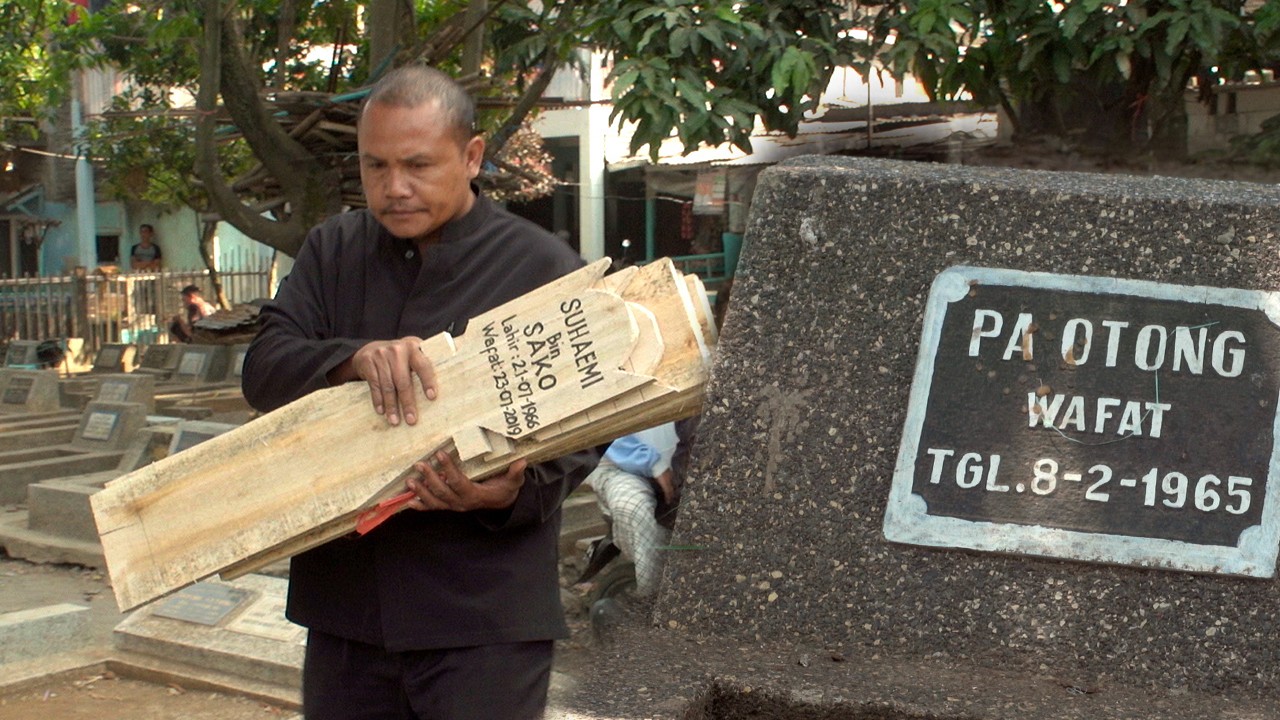This article is part one of a two-part series about the people working on the frontlines of the COVID-19 pandemic.
This article originally appeared on VICE Indonesia.When 63-year-old Maruf bin Khasan’s health took a turn for the worse after showing symptoms of pneumonia, his son brought him to the emergency room. Khasan had a pre-existing lung condition that worsened his shortness of breath, a common symptom of COVID-19.
This article originally appeared on VICE Indonesia.When 63-year-old Maruf bin Khasan’s health took a turn for the worse after showing symptoms of pneumonia, his son brought him to the emergency room. Khasan had a pre-existing lung condition that worsened his shortness of breath, a common symptom of COVID-19.
Advertisement
If left untreated, shortness of breath can lead to hypoxia, or low blood oxygen, and even death if the lungs are too weak to function normally.Khasan was treated as a suspected coronavirus patient and given oxygen and antibiotics. Still, he showed no signs of improvement. On April 6, he passed away without ever having been tested for COVID-19.
The body of a suspected coronavirus patient inside a plastic-wrapped coffin.
Because he exhibited COVID-19 symptoms, Khasan’s body was buried in accordance with guidelines for handling deceased coronavirus patients. This included wrapping his body in plastic before being laid in a nylon-lined coffin, which was then sealed and wrapped again in plastic.
As is customary with Indonesian burials, Khasan’s family hoped to bathe, wrap, and deliver his body to his final resting place. But the process went by so fast that they never had a chance to officially part with their loved one.“We couldn’t even say goodbye or pray beside him,” said Satria, Khasan’s 30-year-old son. “We never thought he’d leave us this way.”Sofyan, a hearse driver with a busy schedule, made his way toward a white hearse to gather the bodies of deceased coronavirus patients.“I’m on my way to pick up another body, they’re waiting on me,” Sofyan said from the driver’s seat of a government-owned hearse. “I didn’t have time for lunch, so I’ll have to eat while I drive.”Sofyan has been driving a hearse for an organisation known as the Black Cross for over 10 years. Since the pandemic began, he and 48 other drivers have been working round the clock.
Advertisement
The Black Cross’ office is a 6 x 7-metre room. In one corner stood boxes of masks and gloves. In another corner was a table stacked with burial documents and a phone that rang constantly throughout the day with requests for body pick-ups.The Black Cross existed in colonial times as a private organisation, but is now operated by the Indonesian government.
SOFYAN prepares to pick up the bodies of people who likely died of the coronavirus.
The Black Cross provides free mortuary services to the public, picking up anyone from murder and accident victims to unclaimed bodies and people who die of disease. The group bathes, wraps, and delivers bodies to the cemetery.Since the coronavirus pandemic hit Jakarta in early March, Sofyan has been working long hours at minimum wage. He has been delivering six to eight corpses per day from hospitals to cemeteries, a steep increase compared to his usual workload.“From the time we get on the road to the time we arrive at the graveyard, working on one body can take up to four hours. With coronavirus victims, we have to act fast to abide by guidelines. My life is on the road now,” Sofyan told VICE.
In a press conference in late March, Jakarta governor Anies Baswedan declared that the government had buried 283 bodies in accordance with guidelines for burying COVID-19 victims.As of April 8, Indonesia has reported 2,738 confirmed cases of COVID-19, with 221 deaths and 204 recoveries. The nation has a death rate of 10.68 percent — currently the highest in Southeast Asia.
In a press conference in late March, Jakarta governor Anies Baswedan declared that the government had buried 283 bodies in accordance with guidelines for burying COVID-19 victims.As of April 8, Indonesia has reported 2,738 confirmed cases of COVID-19, with 221 deaths and 204 recoveries. The nation has a death rate of 10.68 percent — currently the highest in Southeast Asia.
Advertisement
The demand for coffins has also increased since the pandemic. Tri Nurcahya, a morgue worker who builds coffins, said he now builds over 30 in a single day. The coffins are made of flimsy wood painted brown, with an orange nylon lining made of the same material used for body bags.
Stacks of coffins built for patients believed to have died of the coronavirus.
“We have a stock of two dozen coffins in the back. By next week, it will be long gone,” said Nurcahya. “We have already asked the department of forestry for more raw materials.”On March 28, Baswedan requested the central government to implement a regional quarantine in Jakarta and restrict movement to and from the city. After going back and forth on the issue, the central government finally approved large-scale social restrictions in the capital on April 7.For mortuary workers like Sofyan, the government decree does not change anything. Even though he operates according to strict guidelines and has access to personal protective equipment (PPE), there is still a looming fear of infection, he told VICE.Frontline workers face great risks while on the job. At the time of writing, the Indonesian Doctors Association has reported that 19 doctors and six nurses have died of COVID-19.
A cemetery worker must spray disinfectant and change clothes after the job.
“At a time when people should be practicing social distancing, we are closer to the dead than to the living,” Sofyan said. “It’s still a risk.”Government statistics place the number of burials in Jakarta in March at 4,400, a 40 percent increase from the previous month. This raised suspicions that the COVID-19 death rate might be higher than what the government is reporting.
Advertisement
At the Tegal Alur cemetery, hearses come and go throughout the day. Asep, a gravedigger, is constantly on standby to receive new arrivals. A one-hectare (10,000 square metres) plot of land designated for deceased coronavirus patients is blocked off from the main cemetery. Nearby residents made complaints that the cemetery was accommodating COVID-19 patients, but the cemetery had complied with WHO guidelines when designating the plot at least 500 metres from any residential areas.The blue excavator smashed into the earth, digging ten graves by midday. Asep and his team bury up to a dozen bodies a day. So far, 56 graves have been excavated exclusively for deceased coronavirus patients. Most of them do not have headstones or identifiers. Only the cemetery staff have records of who is buried, and where.When another hearse pulled into the cemetery, the gravediggers approached the vehicle in full PPE. When masks, suits, and gloves are in short supply, they use plastic raincoats instead.“We use bleach or carbolic acid as a disinfectant,” said Asep. “We went through the supply from the health department fast.”
A deceased patient’s family can only take photos around the grave;.
The team then hauled a plastic-wrapped coffin out of the hearse and spent the next hour securing it in the ground. “It was a quiet burial,” Asep noted.Shortly thereafter, Asep’s phone rang. “Not today, we’re fully booked. You know how it is. Maybe tonight,” he told the voice at the other end of the line.
Advertisement
Roughly 40 gravediggers work on the 50-hectare plot of land that makes up Tegal Alur cemetery. Since March 20, when Indonesia saw a sharp increase in coronavirus-related deaths, they have been digging graves day and night. Grave plots designated for those who have died of COVID-19 are running out, forcing Asep and his team to search for more land.
 Satria arrived at the cemetery on a motorbike in search of his father. Asep redirected him to a grave without a headstone, which had been sprayed with disinfectant. Satria pulled out his phone, snapped a photo, and closed his eyes in prayer.Large gatherings, including those at places of worship, have been restricted since the pandemic. Because of this policy, families like Khasan’s were made to stay home while their loved ones were being laid to rest, forcing them to forgo the usual burial ceremony and seven-day rituals that typically follow Islamic funerals.“Maybe when the pandemic is over, we’ll do the rituals at home,” said Satria. “In the meantime, all we can do is pray.”
Satria arrived at the cemetery on a motorbike in search of his father. Asep redirected him to a grave without a headstone, which had been sprayed with disinfectant. Satria pulled out his phone, snapped a photo, and closed his eyes in prayer.Large gatherings, including those at places of worship, have been restricted since the pandemic. Because of this policy, families like Khasan’s were made to stay home while their loved ones were being laid to rest, forcing them to forgo the usual burial ceremony and seven-day rituals that typically follow Islamic funerals.“Maybe when the pandemic is over, we’ll do the rituals at home,” said Satria. “In the meantime, all we can do is pray.”


